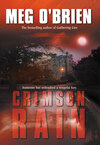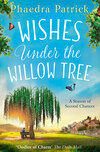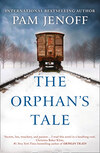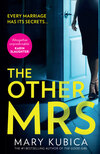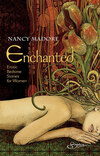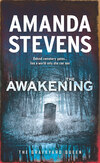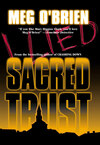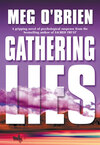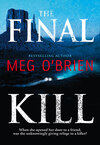Kitabı oku: «Crimson Rain», sayfa 3
Paul sighed. “We thought that was best. We’ve always just tried to do the best for you, Rachel. Your mother and I love you. We really do. I wish you could believe that.”
Rachel fell silent. He thought she was going to argue the point, but she shrugged back into her coat and said, “Let’s blow this place. Mom’ll be waiting to get a tree.”
Paul didn’t know whether to be disappointed or relieved. He half wanted to continue the conversation, while the other half didn’t want to go near it.
He put enough money on the table to cover the food and a tip. Again he found himself following his daughter as she breezed out the door. The door came swinging back and almost struck him in the face.
It was as if she were deliberately erecting a wall between them. I can’t let that wall get too high, he thought miserably as they walked back to the Four Seasons, where they had both parked. If she makes it any higher, I might never be able to breach it.
At home, Gina was already cleaning out the trunk of the Crown Vic, which was big enough to put a tree in with a bungee cord holding the lid down.
“Let me help you with that,” Paul said, taking a heavy flat of bottled water from her.
She threw him a grateful look and pulled her red scarf closer around her throat. She looks like she did in college, Paul thought. The cold, misty air had softened the few lines around her eyes, which were bright with anticipation. She’s like a kid about Christmas. How could I have forgotten that?
They began the rounds of the tree farms in Snohomish, where the traffic was thinner and they could enjoy the drive. Since it was two days before Christmas, a lot of the better trees had been taken long ago. Gina insisted they make the tree shopping spree as much fun as possible, singing songs in the car as they always had, to pass the time. She seemed not to notice that Paul and Rachel were more quiet than usual. Their search spread farther and farther away from the city, until, finally, they came across a farm that hadn’t been too stripped. It was their fourth try, and Gina and Rachel stood together in the mud amongst rows of Douglas firs, shivering.
“What do you think of this one?” Gina asked.
“Too skinny,” Rachel complained. “I like this one better.” She stood holding a branch of a wide nine-footer.
“That won’t even fit through the door!” Gina said, smiling.
Paul was three rows over when he called out, “Hey, look at this!” They trudged valiantly over the rutted ground, expecting to reject this one as they had the past five.
“I love it!” Rachel said when she saw the tall, perfectly shaped fir. She cocked her head to the side and smiled. “No holes, no broken limbs. You always were the best at picking them out, Dad.”
“Oh, I don’t know. It’s only taken me—” Paul pushed back his jacket sleeve and looked at his watch “—two hours and four tree lots this time.” But he smiled, grateful that she seemed to be getting into the spirit of things. Maybe this day would turn out all right after all.
Finding the “perfect” Christmas tree had been a tradition ever since he could remember. There had been times over the years when he’d thought about leaving Gina, when it had seemed as if there was so little left of their relationship it hardly made sense to go on. Even the bad Christmas Eve memories, however, couldn’t spoil the fact that there was something solid and safe about doing things like this together, and knowing they would be doing them year after year.
When it came right down to it, there hadn’t been any good reason to break up his marriage. Gina might have distanced herself from him, but she still maintained a surface relationship, keeping up the house, being there for Rachel. He’d never even thought of straying…not until Lacey came into his life, offering boundless energy when he was weary, and light at a time when his very existence seemed to grow darker every year.
“Earth to Dad!” Rachel was saying. “Hello?”
Paul came back to the matter at hand. “So you really like this one? Should I start cutting?”
“Absolutely,” Rachel said. “Okay with you, Mom?”
“Cut away,” Gina replied, blowing into her hands for warmth. “And fast. Let’s get the heck out of here!”
“Darn it,” Rachel said, “I told you to wear gloves. But not to worry.” She put an arm around her mom as Paul began to saw through the trunk of the fir. “We’ll be at the tearoom soon. You can warm up there.”
The tree fell, and Rachel cried, “Attaboy, Dad! You’d put Paul Bunyan to shame!”
Paul grunted. Looking at Gina and his daughter, at the smiles on their faces and the way they both rose to the occasion when good spirits were called for, he could only think: I wish I were a Paul Bunyan, a giant possessed of superhuman powers. Maybe then I could figure out a way to fix this moment in time forever.
After dragging the tree into the house and changing clothes, they drove down the hill to the tearoom. In an old Victorian house with several differently decorated rooms, it was warm and toasty from a huge fireplace in the large front room. Taped chamber music was soft and soothing, and the scents of cinnamon, apples and other holiday treats stimulated the appetite and brought back memories of traditional Christmases Paul had enjoyed as a child.
This, too, was a tradition that Paul, Gina and Rachel had followed. First the cutting of the tree—from a lot where trees were specifically grown for Christmas, to ease Rachel’s concern over the destruction of the forests—and then tea, to warm themselves up.
Over the subdued murmur of voices and the gentle clinking of bone china cups against saucers, Paul looked at his wife and daughter. Rachel’s cheeks were still pink from the cold, and the bright pink scarf she wore mirrored them. Her eyes shone in the candlelight. Without warning, a memory rushed in: Angela, and the way her eyes had been so like Rachel’s in color, that clear, lovely hazel, yet always with a flicker of mischief in them.
Rachel was wrong in thinking he’d had some sort of contact with Angela. Yet her instincts were right. Everything about this season combined to form a gunnysack of immense proportions that he seemed destined, always, to carry on his back. He knew that if he opened that sack, more bad memories than he’d ever be able to live with would spill out.
It was one of the reasons, he admitted to himself, that he’d become involved with Lacey. In September, the stores had already been bringing out the Christmas toys and decorations. They were everywhere, and Paul had begun to dread the coming holiday even more than usual this year. There were times when he felt certain his life was over, and other times when he wished it were.
This past summer, he and Gina had barely seen each other for weeks on end. She was working on a house up on Camano Island, more than an hour away, and she often came home late. Finally he had stopped going home after work, and had begun to have dinner in the city. His favorite place was the Gordon Biersch Brewery Restaurant, because there were always plenty of people there—young people, active and happy, or at least seemingly happy as they laughed and drank together after their day’s work. Sitting in a bar drinking wasn’t Paul’s idea of a rousing good time, but having dinner at the bar and watching everyone around him enjoy themselves made him feel less lonely.
He hadn’t started out with the thought that he might meet someone. At least, not consciously. He told himself he was merely passing the time. Then one night, a young blond woman at the other end of the bar began to make eye contact with him. At first, he was embarrassed. He hadn’t been with anyone but Gina since they’d met in college. On this particular night, however, Paul found himself wanting someone to talk to. That was all, he swore to himself—just talk.
So when the woman smiled at him the third or fourth time their eyes met, instead of looking quickly away as she’d done at first, Paul took that as an invitation to move to the stool beside her and join her for a drink.
It had been awkward at first. Paul found himself at a loss for words. Funny, he thought. All this time I’ve been wanting someone to talk to, and now I don’t know what to say.
But the woman made it easy for him.
“Hi, I’m Lacey,” she said softly, holding out a hand. “May I buy you a drink?”
Paul smiled and shook her hand. “I thought the man was supposed to buy the woman a drink.”
Lacey laughed and tossed her head, shaking back the lush blond hair that fell over her face on one side. Her eyes were a deep, deep green, so deep that when Paul looked into them he felt like a teenager striving for just the right poetic phrase. What he came up with was clichéd, he knew, but he honestly did feel as if he were falling into the depths of some long-forgotten, ancient sea. As for her complexion, it was creamy and flawless, except for a small half-moon scar at the corner of her right eye. She had covered it with makeup, making it less noticeable, but when she turned into the light from behind the bar, it stood out in sharp relief.
Paul was glad she had a flaw. Without it, he might have been intimidated by her beauty.
“What old-fashioned world did you come from,” Lacey teased, “thinking the man has to buy the drink?” Nodding to the bartender, she pointed a finger at his nearly empty drink glass. “Don’t tell me. You’re married, and you haven’t dated in years. And you don’t want to get involved. Well, that’s perfect, because I don’t want to, either.”
The bartender set the drink before him, and Paul relaxed. They began to talk. At ten o’clock they were still talking, and Paul, shocked at the time, said that he had to go.
“Maybe I’ll see you here again,” he said tentatively, unwilling to commit to an actual meeting, but hoping she would be here, nonetheless.
“Maybe,” she said. “I stop by after work now and then.” She touched him on the cheek with a fingernail that was bright red, like her lips. “We’ll see.”
That had been in August. Four short months ago, but he felt, now, as if he’d known her forever.
Their first conversation had carefully skirted personal information. Instead, they had talked about Microsoft, the Huskies, the Mariners, Boeing, the traffic…endless minutiae. In succeeding talks he told her about Gina and Rachel. She told him she had moved to Seattle in June and was working temp jobs. It had been difficult at first, but now she was established with one particular temp company, and in demand as an assistant to local CEOs. She living frugally, but was doing all right.
She seemed to want nothing from him but companionship, and that eased Paul’s mind about what he was doing. By the time a month had passed, however, Paul couldn’t tear himself away from the three- or four-times-a-week meetings at Gordon Biersch’s. He began to tell Gina he was working late, and she had accepted that.
But then, why wouldn’t she? he thought now as he looked across the table at his wife. He had never before given her any reason to doubt him.
And here she was, holding the family together as usual over the holiday—keeping the traditions and maintaining a brave facade for Rachel, even though she must know, as he did, that their marriage was falling apart.
Or was it a facade? Had Gina actually convinced herself there was nothing wrong? Was it possible she couldn’t see how much their relationship had deteriorated?
There were times when Paul hated himself for the betrayal of his wife, and he prayed for the strength to end it.
“Can we decorate the tree tonight?” Rachel asked from the back seat as Paul swung the Infiniti into the driveway. “That tea really hyped me up.”
Gina restrained a yawn. “Oh, I don’t know…”
“C’mon, Mom. Talk her into it, Dad.”
They had left the tree standing in a bucket of water in the front bay window of the house, facing the Sound and the city. When it was decorated and lit, it looked “awesome,” as Rachel said every year, when they drove up the hill.
“We’ve still got two more days till Christmas,” Paul said, wanting only to go to bed. “Can’t it wait?”
“Boy, you two are party poopers this year.” Rachel pouted. She slid from the car and ran up the front steps. “Last one in has to untangle the lights!”
She slid her key into the lock and disappeared through the doorway. Lights appeared in the hallway and living room. Gina looked at Paul and shrugged. “What do you think?”
He sighed. “At least she’s smiling now. I was beginning to think—”
“I know what you mean,” Gina said. “She’s been a bear this trip.”
“Maybe we can convince her just to put on the lights tonight. You think she’d be okay with that?”
“We can give it a try,” Gina said.
Rachel’s cry from inside hit them as they came up the walk. “Mom! Dad!”
Gina and Paul ran the rest of the way, following Rachel’s voice into the living room. There they found the Christmas tree lying on its side, a pool of water surrounding it. The bucket lay empty on the hardwood floor.
Gina rushed forward, whipping off her woolen scarf and kneeling, trying to mop up the water before it did any more damage to the wood. “For God’s sake, Paul, I told you to make sure the tree was secure enough so it couldn’t fall!”
“I did,” he said, bristling at the criticism. “I’ll go get some towels.”
“Never mind. Rachel, get me that throw cover over there.”
Gina motioned to a heavy throw lying over a chair, but Rachel didn’t move. Her face was pale as she stared at the tree, her eyes dark and frightened.
“Rachel?” Gina’s tone was one of concern more than irritation, but Rachel’s head snapped up and she took a step backward.
“Don’t touch me! Get back!” Her hands rose as if to protect herself.
Gina started, and Paul stopped in his tracks to stare at his daughter.
“Rachel?” he said softly. “Rach, it’s okay.”
Gina rose slowly and moved carefully toward her daughter. “Shh. Shh, honey, it’s all right.”
Rachel’s gaze rose from the fallen tree to her mother. For a moment she barely moved. Then her face crumpled and tears filled her eyes. “It’s not all right!” she cried. “Nothing is ever going to be all right again!”
3
The next day, Rachel sat across from the psychiatrist who had treated her from the ages of six to sixteen. Victoria Lessing was older, of course, her hair graying now, but only a bit at the temples. Otherwise it was the same pale blond, pulled back into a twist. She still had that look in her violet eyes, too—the one that said, I know your every thought. You can’t hide a thing from me.
“It’s been a while, Rachel.”
Rachel sighed. “You said it. I thought we were through with all this.”
“Well, your parents are worried.”
Rachel gave a shrug.
“You don’t think they should be?”
“No. I just had some bad memories last night. After all, today is Christmas Eve. I think that’s pretty normal.”
“Normal being a relative term,” the psychiatrist said, smiling.
“I suppose.” Rachel fell silent.
“Have you been thinking more about your sister lately?”
“I don’t know,” Rachel said. “Maybe.”
“Do you know why?”
“No.”
“I think you do,” Victoria said softly.
Rachel shrugged again. “I just thought I saw her, once. At Berkeley.”
Victoria leaned forward, resting her arms on her desk. “Really?”
“Well, I was walking around on the campus, and there was this woman. She had dark hair like Angela’s and mine, and…oh, I don’t know. There was just something about the way she looked at me.”
“Did you think she was following you?”
Rachel narrowed her eyes. “You mean, am I getting paranoid again?”
“No. I didn’t mean that at all.”
“But you were thinking it. Rachel’s imagining things again.”
“No, I was not,” Victoria said firmly. “You were a lot younger when you had nightmares that Angela would come back. Now that you’re older, I’m sure you know the difference between being paranoid and feeling something real.”
“Well, I didn’t think this woman was following me, anyway. I just thought it was odd, the way she looked at me. I thought maybe Angela—” Rachel stopped talking and studied her hands.
“You thought that because she was your twin, she might have ended up at the same college as you,” Victoria guessed. “The way identical twins who are separated seem to do similar things in life?”
“I…yes. I guess the thought crossed my mind.”
“Of course you and Angela aren’t identical.”
“No. But does that matter?”
“I’m not sure. You don’t have the same DNA, of course. As for other possibilities…did you try to find out if she was a student at Berkeley? Through the registrar’s office, for instance?”
“No,” Rachel said abruptly.
“You didn’t really want to know,” Victoria guessed again. “Because if it was Angela, you’d have had to do something about it. You’d have had to look her up and talk to her.”
Rachel frowned. “I wish you wouldn’t read my mind that way.”
“That bothers you?”
“Of course it does! You’ve always done that, and it drives me nuts.” Rachel paused, then laughed. “I guess that’s not the sort of thing to say to a psychiatrist.”
Victoria smiled. “We’ve known each other a long time, Rachel. You should know by now, you can say anything to me.”
Rachel hugged herself with her arms, feeling cold even though the room was warm. “I just think it’s silly, Vicky, my parents getting all worried like this. I warped back into the past for a few minutes when I saw that tree on the floor. Doesn’t everybody do that sometimes?”
“Your mother said you were up pacing all night, and you didn’t eat any breakfast this morning.”
“Well, duh! I was upset, for heaven’s sake. I’m over it now.”
“Are you?”
“Yes, dammit!” Rachel gave the therapist a mutinous glare.
Victoria laughed. “I haven’t seen that look since you were…oh, seven or eight.”
The glare faded into a grin.
Victoria reached behind her chair and took a plate from a low mahogany filing cabinet. “Cookie?’
“Geez. I can’t believe you’re still plying patients with chocolate-chip cookies.”
Victoria smiled. “It seems to work.”
Rachel took a cookie. “This is supposed to make me more willing to open up, right?”
“Right.”
She rolled her eyes. “Does psychiatry still work, even when the patient is smart enough to figure out all the moves?”
“Only when the cookies are merely a distraction, to keep the patient from figuring out the real moves.”
“Is that what you’ve been doing to me all these years?” Rachel asked. “Playing mind games?”
“Why would you see it as mind games?” Victoria asked. “Why not simply as a way to help you? A way to get to the truth?”
Rachel snorted. “That assumes there’s any such thing as truth.”
“Are you saying there isn’t?”
Carefully Rachel set the cookie back on the plate. “Let’s approach this from another direction. Do you think you’ve helped me over all these years?”
Victoria hesitated. “I…well, you’ve been going to college, preparing for the future. I certainly think you’re better now than you were when you were sixteen, for instance. Or right after Angela left.”
Rachel’s mood changed in an instant. Jumping to her feet, she clenched her fists at her sides. “Angela left? For God’s sake, Vicky, my sister did not leave! She was sent away—returned to the store, like a defective toaster oven. Why does everyone say she left? Does it make it easier somehow to sweep the truth under the rug?”
“So we’re back to truth,” Victoria said calmly, leaning back in her chair and folding her arms. “What is your truth, Rachel?”
Rachel threw up her hands. “How the hell do I know?”
“Do you want to know?”
“I…of course I do!” But she had paused before answering, and Victoria picked up on it quickly.
“What are you afraid of?” she asked.
Rachel sat again, rubbing her face and taking a deep breath. “I don’t know. I think…I think I’m afraid of Angela. Of what I might find out if I saw her again.”
“Have you been wanting to see her again?”
“I haven’t even really thought much about her since I’ve been away at school. Then all of a sudden, I thought for sure she was there, and it all started up again.”
“What started up?”
Rachel gave Victoria a shaky smile. “The fear. It was like déjàvu. It just washed right over me, like some awful wave. I started to shake, and I actually thought—”
“What? What did you think?”
“It’s…it’s silly.”
“Nothing about fear is silly. Remember when I taught you to turn around and face the monster in your nightmares? What happened?”
“It went away,” Rachel admitted. “The nightmares stopped.”
“So you know you can trust me, right?”
“I guess.”
“Then tell me, Rachel. What did you think when you saw—or thought you saw—Angela?”
“I guess I thought, what if she came here to kill me?” Rachel said, looking down at her hands again. They were shaking.
Victoria rested her chin on tented fingers. “And how does it feel now that you’re home? Safer?”
“God, no! It feels worse. Vicky, I keep thinking something awful is about to happen. And my parents—” She paused.
“What about your parents?” Victoria pressed.
“Oh, hell, they aren’t even here anymore. They’re both doing their own thing, and they hardly talk to each other.”
“I see. When did you first feel this about them?” Victoria asked.
“Last summer, I guess. It was so weird, I couldn’t wait to get back to school.”
“So let’s think about this. Do you feel your parents are no longer around to protect you?”
“I don’t know. Maybe.”
Victoria was silent. Finally, she said, “Rachel, let me pose a theory. You’re feeling vulnerable, unprotected, exposed. That could bring up old memories of the night when Angela—”
“Don’t say it,” Rachel interrupted. “I don’t even want to think of it.”
“—when Angela tried to kill you,” Victoria finished, ignoring her. “Look at it, Rachel. See it. Remember it. Then you can let it go.”
Rachel flushed. “You think I haven’t been remembering it all these years? For God’s sake, Vicki!”
“No, what I think is that, as you’ve gotten older, you haven’t been remembering it the right way. We need to work on that.”
“So what you’re saying is that I imagined I saw Angela, because I’m feeling afraid again? My fear conjured her up?”
“Not her, Rachel. A woman who looked like her—” Victoria broke off. “Not even like her, for that matter, since you don’t know what Angela looks like now. Perhaps just some of the same qualities you remember from childhood. Rachel, what does that sound like to you?”
Rachel closed her eyes. “Like I imagined the whole thing. It wasn’t Angela, and she hasn’t come back to try to kill me again. There. Is that better?”
“You tell me.”
“I don’t know!” Rachel’s eyes flashed, and the mutinous glare came back. “Why do I have to do all the work? You’re the one getting paid for this!”
Victoria shook her head and smiled. “You may be a beautiful, grown-up twenty-one-year-old, Rachel. You may be smart, intelligent, all those good things. But I’m still seeing shades of that little girl in front of me. The one who stuck her chin out and told me to go to hell when she was ten.”
Rachel hesitated, then laughed. “I did do that, didn’t I? God, I must have been a handful.”
“Still are, apparently,” Victoria said with a smile. She picked up her appointment book and a pen. “Okay, now. Do you want us to work together while you’re home on vacation, or not? Shall I put you down for the day after tomorrow?”
“Mom likes to hit the stores the day after Christmas,” Rachel said. “How about the day after that?”
“Right.” Victoria wrote it in.
“Uh…can I have that cookie back?”
Victoria had picked up the plate and was putting it on the file cabinet. She swung back and laughed. “Sure. Maybe it’ll sweeten your mood.”
Rachel stood and gathered up her coat, slipping it on with the cookie between her teeth. Then, taking it in her hand, she said, “Vicky…I know we’re making light of this right now. And to tell the truth, I’m kind of relieved that we are. But I still feel, down deep, that something bad is going to happen.”
Victoria got up and came around the desk, wrapping an arm around Rachel’s shoulders and walking her to the door. “You could be right, of course. But let’s not jump the gun. Let’s look at all sides of it first. Okay?”
Rachel nodded, drawing her pink scarf tighter as Victoria opened the door into the hallway. “God, it’s raining again,” she said, looking back toward the office window. “Now that I’m living in California most of the time, I get so depressed up here when it rains.”
“Espresso,” Victoria said, patting her shoulder. “Get yourself some espresso. Better yet, a mocha. The chocolate will do you good.”
“I don’t know,” Rachel said. “Maybe I need some Prozac or something.”
Victoria studied her, meeting her eyes. “Maybe you do. But let’s start slowly. We can talk about that later, after we meet some more.”
Rachel sighed. “Okay. See you in a few days, then.”
“Right.” Victoria touched her cheek lightly with a pale, slender hand. “Rachel…try to have a happy Christmas.”
“You, too,” Rachel said, stepping away.
Going down the long, carpeted hallway to the elevator, she felt awkward, as if she were stumbling. As if the hallway had shrunk, and there wasn’t room now to put her feet anywhere. Or the way it felt during the occasional California earthquakes, even when they were only small tremors. It seemed for days afterward that the ground kept moving—but only slightly, so that it was hard to know whether what she felt was real or not.
She hadn’t told Vicky about these “spells,” which had come and gone several times over the past few weeks. She didn’t want anyone to know. It was probably irrational, but the old fear was back: If I tell them too much, they might send me away, too.
